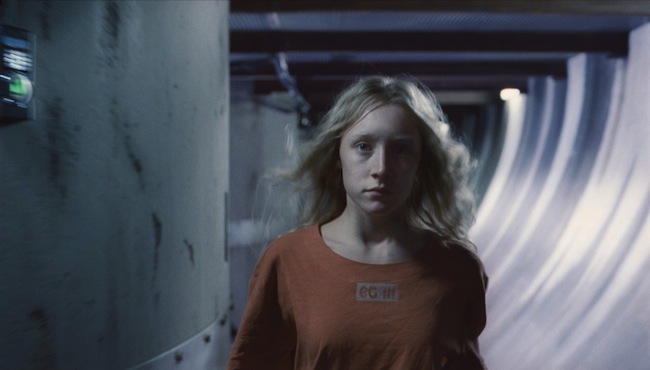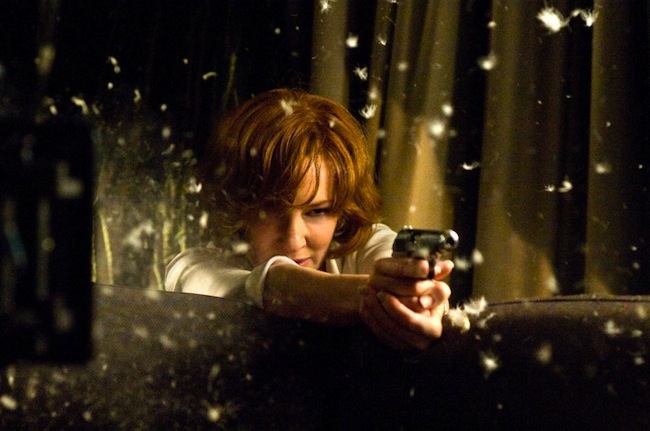“I just
missed your heart,” Hanna (Saoirse Ronan, pronounced ‘Sersha’ like
‘Inertia’) remarks in the opening scene, as she stands over the body
of a wounded reindeer. Unfortunately, for those viewers who have
high expectations of this film, Hanna may just miss
your hearts.

Sixteen-year-old Hanna has lived a sheltered life. Thanks to the
parenting and home-schooling skills of ex-Intelligence agent, Erik (Eric
Bana), she is proficient in hand-to-hand combat, archery, shooting and
speaking such languages as Arabic and Spanish. She is also very much
aware about the existence of Marissa (Cate Blanchett), a ruthless woman
who will stop at nothing to see Hanna dead. Equipped with her
comprehensive set of skills, Hanna believes she is ready to venture into
the brave new world that is Human Society -- replete with boys, music
and technology -- to destroy Marissa and her men once and for all.
Directed by
Joe Wright (Pride and Prejudice, Atonement), Hanna
unfolds as a violent postmodern fairy tale, messily crammed with
differing subgenres: action-thriller, spy/assassin, science fiction,
road trip, family drama, coming-of-age. The main problem with Hanna
is that it can feel excessively self-conscious -- that is, it knows
it’s an arthouse film and shamelessly shows this. For example, the
film’s fairy tale elements can at times be overplayed, leaving little
room for subtlety or nuance. So, during those close-ups of Marissa’s
pearly whites, it feels as if Wright and his screenwriting team are
praying for the viewers to think: ‘My, what big teeth she has!’ It all
seems too calculated and pre-determined. The fact that Erik
accidentally-on-purpose has his final fight scene in an abandoned
children’s playground (of all places) does not help.

Another
slight problem with Hanna is that Ronan can be unconvincing as
the warrior-girl protagonist. Towards the film’s conclusion, Hanna is
revealed to be a born ‘perfect soldier,’ with heightened muscle strength
and reflexes. However, during many combat sequences Ronan appears limp
and lacking in confidence. The rapid jump cuts during some of these
sequences omit a lot of Hanna’s actions, furthering our doubts. How did
she manage to massacre all those armed men? On the bright side, Ronan’s
display of self-assuredness during non-combat moments is impressive, as
depicted in the ‘kissing’ scene with her Spanish date. Yes, she has
surely outgrown her innocent roles in City of Ember and The
Lovely Bones.
The
electronic score provided by Grammy Award-winning duo, The Chemical
Brothers, is a godsend. Spectators disappointed by the film’s rather
forced narrative may view the soundtrack as a redeeming quality,
although the image of a murderous villain whistling a
nursery-rhyme-oriented tune is quite clichéd. To those who aren’t fans
of electronic music, at least Jessica Barden’s performance as Sophie,
the smart-aleck daughter of caravanning Anthropologist parents, will
make a good lasting impression. ‘I found her…She’s from Sri Lanka,’
Sophie incorrectly tells her younger brother upon her first encounter
with Hanna. Think of her as the older, meaner version of Eliza
Thornberry.
Overall,
Hanna takes the tiresome Child vs. Adult/Childhood vs. Adulthood
theme to a whole new level. However, the film still feels very
‘hedgehog-like’ in that it’s cute and clever but, ultimately, very
difficult to hug and cherish. Perhaps we, as spectators, are supposed to
‘adapt or die’ just like our protagonist and learn to love Wright’s
‘Frankenstein’s Daemon’ of a film. Despite its pitfalls, Hanna is
definitely one of the boldest productions to be released this season. If
you do decide to give it a test drive, I’ve got three words for you:
Hold on tight. |